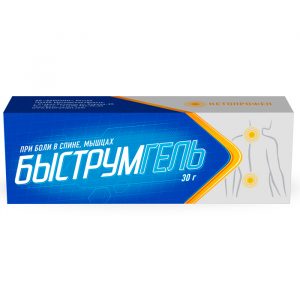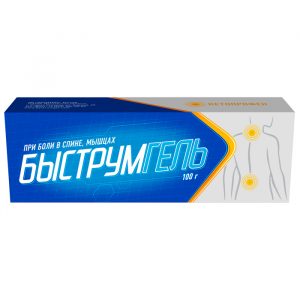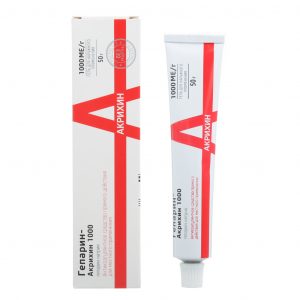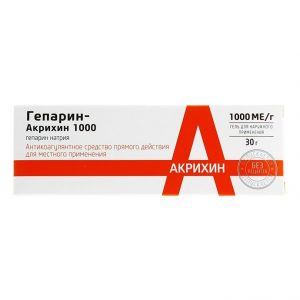Description
Release form
Gel for external use
Packaging
Tuba 30 g.
Pharmacological action
Ketoprofen belongs to the group of NSAIDs that have anti-inflammatory, antiexudative and analgesic effects.
In the form of a gel provides topical treatment of lesions of the joints, tendons, ligaments, muscles, skin, veins, lymphatic vessels and lymph nodes. With articular syndrome, it causes a weakening of pain in the joints at rest and during movement, a decrease in morning stiffness and swelling of the joints.
Pharmacokinetics
penetrates well through the skin. The bioavailability of the gel is about 5%. The absorbed part of ketoprofen binds to plasma proteins by approximately 99%. Metabolized in the liver. About 80% of the dose taken is excreted in the urine in the form of metabolites, less than 10% is unchanged.
Does not cumulate in the body.
Indications
It is used topically as an anesthetic and anti-inflammatory drug for symptomatic treatment: pain in the spine, neuralgia, myalgia,
inflammatory-degenerative diseases of the musculoskeletal system (including arthritis, bursitis, synovitis, tendonitis, lumbago)
uncomplicated injuries, in particular sports injuries, dislocations, sprains or ruptures of ligaments and tendons, bruises, post-traumatic pains
as part of combination therapy for inflammatory diseases of the veins (phlebitis, periphlebitis), lymphatic vessels, lymph nodes (lymphangitis, superficial lymphadenitis).
Contraindications
wet dermatoses, eczema
infected abrasions, wounds, burns
III trimester of pregnancy
lactation (breastfeeding)
increased sensitivity to ketoprofen and / or other factors sensitive to acetylsalicylic acid and other NSAIDs).
Allergic reactions, flushing of the skin, photosensitivity, skin exanthema, purpura.
Use during pregnancy and lactation
In the first and second trimesters of pregnancy, the drug can be used only if necessary. In the III trimester of pregnancy, the use of the drug is contraindicated.
It is not recommended to use during breastfeeding.
Composition
Active ingredient: Ketoprofen lysine salt, 2.5 g / 100.0 g
gel Excipients: polyethylene glycol, methylhydroxybenzoate, propylhydroxybenzoate, carbomer, triethanolamine, purified water.
Dosage and administration
The drug is intended for external use.
A small amount (strip 3-5 cm long) of gel 2-3 times / day, apply to the appropriate area of ??the skin and gently rub.
There is no need to apply a dry dressing, because the gel is well absorbed through the skin, does not smell, does not contain coloring substances, does not leave greasy stains, does not stain clothes.
Side effects
Allergic reactions, hyperemia of the skin, photosensitivity, skin exanthema, purpura.
Drug Interactions
With frequent and prolonged use, symptoms of interaction with other drugs may appear (the same as with systemic use).
When combined with other NSAIDs, corticosteroids, ethanol, corticotropin, ulcers and the development of gastrointestinal bleeding are possible.
Concomitant use with oral anticoagulants, heparin, thrombolytics, antiplatelet agents, cefoperazone, cefamandol increases the risk of bleeding.
Ketoprofen reduces the effects of antihypertensive drugs and diuretics (inhibition of prostaglandin synthesis).
Increases the hypoglycemic effect of insulin and oral hypoglycemic drugs (dose adjustment is necessary). Co-administration with sodium valproate causes a violation of platelet aggregation. Increases the concentration of verapamil and nifedipine in blood plasma.
Avoid contact with mucous membranes and eyes.
The drug should not be applied to damaged skin.
Caution is advised for prolonged use in patients with severe renal or hepatic impairment.
In the event of a rash, stop using the drug and conduct appropriate therapy.
Storage conditions
The drug should be stored in a dark place and out of the reach of children at a temperature of 15 ° to 25 ° C.
Expiration
2 years.
The active substance
Keto profen
Conditions of supply of pharmacies without a prescription
Form of Treatment
claim the gel dlya naruzhnogo primeneniya
Medan Farm, Poland




